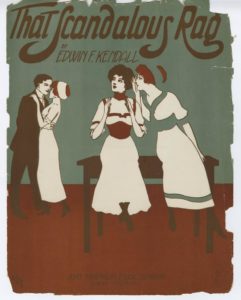Disparaging Trademarks
Back in 2017 the United States Supreme Court ruled that the Section 2(a) of the Lanham Act, barring the federal registration of “disparging” trademarks was an unconstitutional violation of the First Amendment. In that case, an Asian American musician, Simon Tam, attempted to register the trademark “The Slants” for his band. Citing both Section 2(a) of the Lanham Act and Urban Dictionary, the United States Patent and Trademark Office (“USPTO”) refused Mr. Tam’s trademark application on the grounds that the term “may disparage or  falsely suggest a connection with persons, living or dead, institutions, beliefs, or national symbols, or bring them into contempt, or disrepute.” Mr. Tam appealed the USPTO decision to the Court of Appeals for the Federal Circuit, which ruled against the USPTO, finding “When the government discriminates against speech because it disapproves of the message conveyed by the speech, it discriminates on the basis of viewpoint.” The Federal Circuit also held that this section of The Lanham Act constituted unconstitutional content-based discrimination.
falsely suggest a connection with persons, living or dead, institutions, beliefs, or national symbols, or bring them into contempt, or disrepute.” Mr. Tam appealed the USPTO decision to the Court of Appeals for the Federal Circuit, which ruled against the USPTO, finding “When the government discriminates against speech because it disapproves of the message conveyed by the speech, it discriminates on the basis of viewpoint.” The Federal Circuit also held that this section of The Lanham Act constituted unconstitutional content-based discrimination.
The Supreme Court’s Ruling
The USPTO then appealed the Federal Circuit decision to the Supreme Court. In Matal v. Tam, 137 S.Ct. 1744 (2017), The Supreme Court unanimously upheld the Federal Circuit opinion, ruling that “The disparagement clause violates the First Amendment’s Free Speech Clause. Contrary to the Government’s contention, trademarks are private, not government speech.” In the opinion, the Supreme Court included the words of Justice Oliver Wendell Holmes “Speech that demeans on the basis of race, ethnicity, gender, religion, age, disability, or any other similar ground is hateful; but the proudest boast of our free speech jurisprudence is that we protect the freedom to express “the thought that we hate.”
Immoral and Scandalous Trademarks
In addition to barring disparaging trademarks, The Lanham Act also bars the federal registration of trademarks that consist of or comprise “immoral, deceptive, or scandalous matter.” In 2011 an intent-to-use trademark application was filed for the trademark “FUCT.” Erik Brunetti had been using the trademark in association with his clothing line since 1990, so he obtained an assignment of the intent-to-use trademark application and amended it to allege use. The USPTO refused the registration, finding it comprised immoral or scandalous mater. In refusing the registration, the examining attorney “reasoned that FUCT is the past tense of the verb ‘fuck,’ a vulgar word, and is therefore scandalous” and unregistrable.
The Trademark Trial and Appeal Board
Mr. Brunetti appealed the USPTO refusal to the Trademark Trial and Appeal Board (“TTAB”) which upheld the examining attorney’s decision. As noted by the Federal Circuit, the TTAB “noted that the word ‘fuct’ is defined by Urban Dictionary as the past tense of the verb ‘fuck’ and pronounced the same as the word ‘fucked,’ and therefore found it is ‘recognized as a slang and literal equivalent of the word ‘fucked,’ with ‘the same vulgar meaning.'” J.A. 6–7 & n.6. Finding the word vulgar, the TTAB upheld the refusal to register the trademark under §2(a) of the Lanham Act.
The Federal Circuit
Mr. Brunetti then appealed the TTAB ruling to the Federal Circuit. The Federal Circuit did not dispute that the trademark was vulgar. Instead, the Federal Circuit determined five things. First, that federal trademark registration is not a government subsidy program, meaning the government has no authority to regulate the content of the speech. Second, that federal trademark registration is not a limited public forum, meaning the government cannot more freely restrict this type of speech. Third, that the prohibition on the federal registration of immoral or scandalous trademarks targets expressive content of speech and any such prohibitions should be subject to strict scrutiny to see if they meet constitutional muster. Fourth, that the Lanham Act’s bar on the federal registration of immoral or scandalous trademarks does not pass even intermediate scrutiny. Fifth, that there is no reasonable definition (even on Urban Dictionary I presume) that would preserve the constitutionality of the Lanham Act’s bar on the federal registration of immoral or scandalous trademarks. In light of those findings, the Federal Circuit reversed the TTAB, and found the Lanham Act’s bar on the federal registration of immoral or scandalous trademark to be unconstitutional.
The Supreme Court
The USPTO appealed the Federal Circuit decision in In re: Brunetti, 877 F.3d 1330 (Fed. Cir. 2017) to the Supreme Court, arguing that Section 2(a) of the Lanham Act does not restrict speech, but merely establishes permissible viewpoint-neutral eligibility requirements for a federal trademark registration. The Supreme Court accepted certiorari on this case and appears prepared to hear arguments and make a ruling in short order (at least short order as the Supreme Court goes). If the Supreme Court’s ruling in In Matal v. Tam is any indication, it appears likely that the Supreme Court will pare down the Lanham Act even further in this case and rule the Lanham Act’s bar on the federal registration of immoral or scandalous trademark is unconstitutional. So gather all of those immoral and scandalous trademarks you have been hoarding and put your trademark attorney on speed dial. 2019 could be your year.





Recent Comments